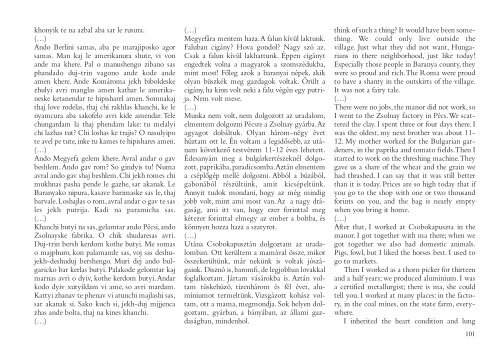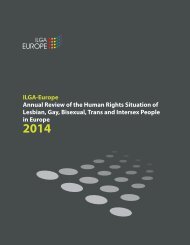Create successful ePaper yourself
Turn your PDF publications into a flip-book with our unique Google optimized e-Paper software.
khonyik te na azbal aba sar le rusura.<br />
(…)<br />
Ando Berlini samas, aba pe marajiposko agor<br />
samas. Man kaj le amerikanura shute, vi von<br />
ande ma khere. Pal o manushengo zibano sas<br />
phandado duj-trin vagono ande kode ande<br />
amen khere. Ande Komároma jekh biboldeske<br />
zhulyi avri manglas amen kathar le ameri ka -<br />
neske ketanendar te hipisharel amen. Somnakaj<br />
thaj love rodelas, thaj chi rakhlas khanchi, ke le<br />
nyamcura aba sakofelo avri kide amendar. Tele<br />
chungardam la thaj phendam lake: tu melalyi<br />
chi lazhas tut? Chi loshas ke trajis? O nasulyipo<br />
te avel pe tute, inke tu kames te hipishares amen.<br />
(…)<br />
Ando Megyefa gelem khere. Avral andar o gav<br />
beshlem. Ando gav rom? So gindyis tu! Numa<br />
avral ando gav shaj beshlem. Chi jekh romes chi<br />
mukhnas pasha pende le gazhe, sar akanak. Le<br />
Baranyako nipura, kasave barimaske sas le, thaj<br />
barvale. Loshajlas o rom, avral andar o gav te sas<br />
les jekh putrija. Kadi na paramicha sas.<br />
(…)<br />
Khanchi butyi na sas, gelamtar ando Pécsi, ando<br />
Zsolnayske fabrika. O chik shudaresas av ri.<br />
Duj-trin bersh kerdom kothe butyi. Me so mas<br />
o majphuro, kon palamande sas, voj sas deshujekh-deshuduj<br />
bershengo. Muri dej ando bulgaricko<br />
bar kerlas butyi. Palakode gelomtar kaj<br />
marnas avri o dyiv, kothe kerdom butyi. Andar<br />
kodo dyiv xutyildam vi ame, so avri mar dam.<br />
Kattyi zhanav te phenav vi atunchi majlashi sas,<br />
sar akanak si. Sako kuch si, jekh-duj mijjenca<br />
zhas ande bolta, thaj na kines khanchi.<br />
(…)<br />
(…)<br />
Megyefára mentem haza. A falun kívül laktunk.<br />
Faluban cigány? Hova gondol? Nagy szó az.<br />
Csak a falun kívül lakhattunk. Éppen ci gányt<br />
engedtek volna a magyarok a szomszédukba,<br />
mint most! Fôleg azok a baranyai né pek, akik<br />
olyan büszkék meg gazdagok voltak. Örült a<br />
cigány, ha kinn volt neki a falu végén egy putrija.<br />
Nem volt mese.<br />
(…)<br />
Munka nem volt, nem dolgozott az uradalom,<br />
elmentem dolgozni Pécsre a Zsolnay gyárba. Az<br />
agyagot dobáltuk. Olyan három-négy évet<br />
húztam ott le. Én voltam a legidôsebb, az utánam<br />
következô testvérem 11-12 éves lehetett.<br />
Édesanyám meg a bulgárkertészeknél dolgozott,<br />
paprikába, paradicsomba. Aztán elmentem<br />
a cséplôgép mellé dolgozni. Abból a búzából,<br />
gabonából részültünk, amit kicsépeltünk.<br />
Annyit tudok mondani, hogy az még mindig<br />
jobb volt, mint ami most van. Az a nagy drágaság,<br />
ami itt van, hogy ezer forinttal meg<br />
kétezer forinttal elmegy az ember a boltba, és<br />
könnyen hozza haza a szatyrot.<br />
(…)<br />
Utána Csobokapusztán dolgoztam az urada -<br />
lomban. Ott kerültem a mamával össze, mikor<br />
összekerültünk, már nekünk is voltak jószágaink.<br />
Disznó is, baromfi, de legjobban lovak kal<br />
foglalkoztam. Jártam vásárokba is. Aztán vol -<br />
tam tüskehúzó, tizenhárom és fél évet, alu -<br />
míniumot termeltünk. Vizsgázott kohász vol -<br />
tam, ott a mama, megmondja. Sok helyen dolgoztam,<br />
gyárban, a bányában, az állami gazdaságban,<br />
mindenhol.<br />
think of such a thing? It would have been something.<br />
We could only live outside the<br />
village. Just what they did not want, Hunga -<br />
rians in there neighborhood, just like today!<br />
Especially those people in Baranya county, they<br />
were so proud and rich. The Roma were proud<br />
to have a shanty in the outskirts of the village.<br />
It was not a fairy tale.<br />
(…)<br />
There were no jobs, the manor did not work, so<br />
I went to the Zsolnay factory in Pécs. We scattered<br />
the clay. I spent three or four days there. I<br />
was the oldest, my next brother was about 11-<br />
12. My mother worked for the Bulgarian gardeners,<br />
in the paprika and tomato fields. Then I<br />
started to work on the threshing machine. They<br />
gave us a share of the wheat and the grain we<br />
had thrashed. I can say that it was still better<br />
than it is today. Prices are so high today that if<br />
you go to the shop with one or two thousand<br />
forints on you, and the bag is nearly empty<br />
when you bring it home.<br />
(…)<br />
After that, I worked at Csobokapuszta in the<br />
manor. I got together with ma there; when we<br />
got together we also had domestic animals.<br />
Pigs, fowl, but I liked the horses best. I used to<br />
go to markets.<br />
Then I worked as a thorn picker for thirteen<br />
and a half years; we produced aluminium. I was<br />
a certified metallurgist; there is ma, she could<br />
tell you. I worked at many places: in the factory,<br />
in the coal mines, on the state farm, everywhere.<br />
I inherited the heart condition and lung<br />
101



